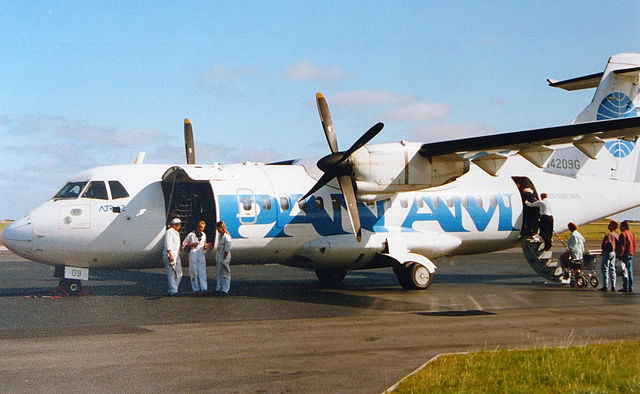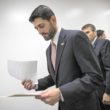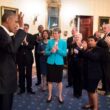(Source: Wikipedia)
In one of the best-known exchanges of all the Sherlock Holmes stories, Holmes mentions to a Scotland Yard detective the “curious incident of the dog in the night-time” (a clue in the theft of a racehorse). When the detective points out that the dog had done nothing that night, Holmes replies: “That was the curious incident.”
The controversy about the Justice Department’s recent anti-trust suit, attempting to block the proposed merger of American Airlines and U.S. Airways, contains a similar curiosity.
| Conservatives want airlines to have their way. Liberals want market competition. But no one is talking about something that was once common until the 1970s: the regulation of “natural monopolies.” |
New York Times columnist James B. Stewart struck a tone sympathetic to the Justice Department’s case: “It’s pretty clear what happens when concentration increases substantially on a route between two cities.” (Airlines jack up fares.) Forbes‘ Richard Aboulafia decried the suit as “Capricious. Incompetent. Misguided.” He argued that, if successful, the move would prevent the formation of a strong, new airline that would increase competition internationally. Fox News featured Ayn Rand Institute analyst Thomas A. Bowden arguing, predictably, that “corporations have a moral right to merge without government permission.”
This range of reactions, for the anti-trust action or against it, holds true to form. The conservatives want to let big business have its way, while the liberals’ answer is market competition (with a nudge from the government). The curiosity lies in the media’s discussion of the kind of industry-specific regulation—including price regulation—that was common in the United States until the late 1970s. But there has been little or no mention of this kind of regulation. To borrow Holmes’ words, that was the curious incident.
Before deregulation, industries including transportation, communications, utilities, and banking were all highly regulated—and with a strong economic rationale. Most of these industries, but banking especially, had important effects on the broader economy. (The Great Depression proved, and the current crisis has confirmed, that an unstable financial system can detonate an economy-wide crisis.) Railroads, utilities, and the like, moreover, are “natural monopolies.” It is more economically efficient for an industry to consist of a single company than two competing companies, if the latter requires two parallel sets of train tracks, water pipes, electrical or telephone lines, etc. To keep the monopoly company from price gouging, however, governments traditionally opted for either price regulation or public ownership, rather than anti-trust action.
The particulars of the airline industry also provide a rationale for government intervention. Unrestrained competition just doesn’t work well. Airlines have very high fixed costs—costs that a company has to pay, regardless of how much output it produces—mostly in the form of aircraft leases. If an airline runs more flights, it has to pay for more fuel and more labor (these are variable costs). But it has to pay for the planes whether they fly or not. That makes the industry susceptible to bouts of “cutthroat competition”—where companies fly for fares that just cover their variable costs, in hopes that they can win a price war and gobble up more market share. The alternative—airlines engaging in tacit or explicit price collusion—is hardly preferable.
If the economic logic was so strong, what killed regulation in the 1970s? The answers have less to do with economics than politics. First, regulation wasn’t all it was cracked up to be. Many highly regulated industries became poster children for “regulatory capture.” Commercial air travel became, basically, a government-sponsored cartel. Consumer advocates didn’t exactly leap to the defense of regulation when it came under attack. More importantly, deregulation was brought down by the power of big business—but with a twist. The big companies in regulated industries, by and large, didn’t want deregulation. Big business as a whole, however, had mobilized behind a broad “free market” agenda, aiming primarily at breaking the power of organized labor and turning the tide on the new “social” regulation (environmental, occupational safety and health, and consumer protection).
Some business leaders may have favored deregulation because their companies were customers of highly regulated industries (e.g., electrical utilities) and believed, sincerely, that deregulation would bring down their costs. The most far-sighted may have anticipated that it would end up weakening unions in sectors like transportation and communications, and therefore weaken the labor movement as a whole. Above all, however, they were fighting a bigger war over the general course of U.S. economic policy. It would have been hard for business leaders to raise the banner of “free markets” everywhere and always, but then defend regulation when it suited their brethren in highly regulated industries.
Above all, airline deregulation was supposed to deliver lower prices and higher ridership. The Harvard Business Review’s Justin Fox, however, notes that fares grew at less than the general rate of inflation during the era of regulation; since deregulation, at more than twice the rate of inflation. Likewise, ridership grew faster under regulation than it has since. He concludes that “smarter, less-intrusive” regulation could have “left the airline industry and its passengers better off than the full deregulation we got.”
Of course, the cost of air travel is, in the grand scheme of things, a relatively minor issue. It does not compare to issues like economic inequality, unemployment, personal debt, or environmental sustainability—where the solutions require fundamental structural change. If economic orthodoxy rules out sensible solutions to relatively small problems, though, think of the damage it does on the really big ones.
Alejandro Reuss is co-editor of Dollars & Sense.





0 Comments